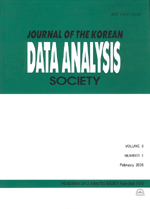자기조절학습 전략이 학업성과에 미치는 영향
The Effect of Self-regulated Learning Strategy on Academic Achievement in e-Learning
- 한국자료분석학회
- Journal of The Korean Data Analysis Society (JKDAS)
- Vol.12 No.3
-
2010.061717 - 1728 (12 pages)
- 134

본 연구는 e-learning 학습 환경에서 학습자의 자기조절학습 전략이 학업성과에 미치는 영향을 밝히고자 하는데 목적을 두고 있다. 이를 위해 본 연구에서는 사회복지 교과목 온라인 학습자가 활용하는 자기조절학습 전략이 학습만족, 학습성취, 학업성적에서 그 효과가 유의미하게 나타나는지 살펴보았다. 연구방법은 온라인대학교에서 동일교수가 담당하는 사회복지 교과목 수강자를 대상으로 설문조사하여 수집된 자료(107명)를 분석하였다. 연구결과 첫째, 자기조절학습 전략은 학습만족 51.6%(R²=.516), 학습성취 35.4%(R²=.354), 그리고 학업성적 23.5%(R²=.235)를 설명하고 있었다. 두 번째, 학습만족, 학습성취, 학업성적에 자기조절학습 전략 영역 11개 중에서 유의미하게 나타난 요소는 학습만족에서는 환경의 구조화, 자료검토, 학습성취에서는 자기평가, 학업성적에서는 자기귀인, 시간관리였다. 학습만족, 학습성취, 학업성적에 영향을 미친 자기조절학습 전략의 영역을 통해 사회복지 교과목 e-learning 학습자는 인지전략 또는 자기관리 전략보다는 초인지전략을 사용하여 학업성과를 높이고 있었다.
The purpose of this research was the impact of self-regulated learning strategy on academic achievement in e-Learning. The study were to investigate the self-regulated learning strategy related learning satisfaction, self-academic achievement, and students’ records of this semester. A survey was conducted from May, 2009 to June, 2009, and 107 responses of e-learning social welfare education learners from the survey were used for the analysis. The research findings can be summarized as the following. First, self-regulated learning strategy of e-Learning learners is indicated significantly affecting learning satisfaction(R²=.516), self-academic achievement(R²=.354), and students’ records of this semester(R²=.235). Second, the significant predictor to explain self-regulated learning strategy was environmental structuring, reviewing records in learning satisfaction, self-evaluating in self-academic achievement, and self-consequenting, time management in students’ records of this semester. The results showed e-learning learner more meta-cognitive strategies than cognitive strategies or self-management strategies.
Ⅰ. 서론
Ⅱ. 연구방법 및 절차
Ⅲ. 연구결과
Ⅳ. 결론 및 제언
참고문헌
(0)
(0)